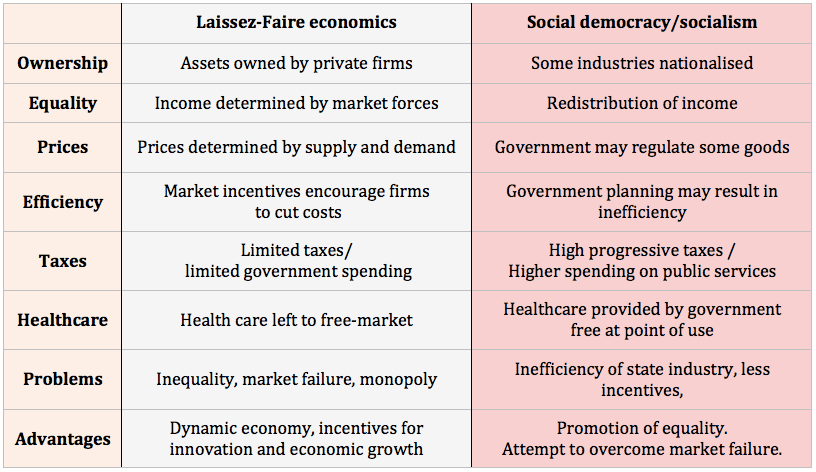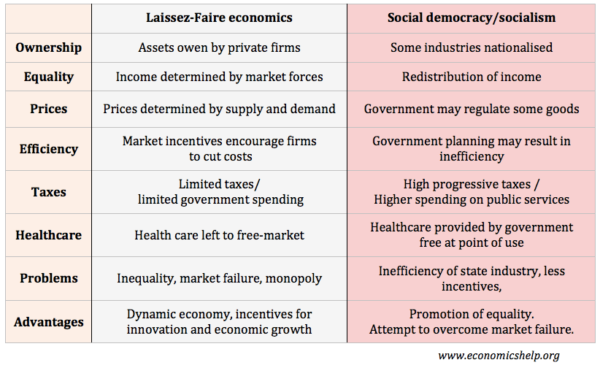Classic Laissez-faire Theory Is Based on the Idea That
This term is associated with Boisguilbert and Legendre. The Invisible Hand refers to uncontrolled competition with greed as the major factor in fact it is considered by some to be the purest form of competition due to the fact that laissez-faire is basically the.

Laissez Faire Economics Economics Help
Laissez-faire advocates nonintervention or minimum intervention by government in the economic affairs of a.

. A free market manifests a scenario without government intervention. Government monopolies stimulate economic growth. Economic competition unleashes growth and innovation.
Laissez-faire is an economic theory which states that there is an Invisible Hand guiding the economy thus there is no need for government involvement. The idea is that removing regulations or taxes helps put more money into the market by encouraging spending. Adam Smith was an 18th-century Scottish economist philosopher and author who is considered the father of modern economics.
Read more ideas promoting the free market free trade and free competition for economic growth. Classical economics is associated with laissez-faire economics which is the idea that the economy works best when government has minimal or no control over it. More money was associated with less products and inflation.
Classical liberalism is a political and economic ideology that advocates the protection of civil liberties and laissez-faire economic freedom by limiting the power of the central government. While laissez-faire is a philosophy where the government is hands-off business. The origins of laissez-faire.
Classic laissez-faire theory is based on the idea that a. The classical liberal thinkers like Adam Smith wanted to answer the question of how to maximizes your happiness. On the contrary they were more than willing to see government provide tariffs railroad subsidies and internal improvements all of.
Smith argued against mercantilism and was a major proponent of laissez. The theory emphasized laissez-faire Laissez-faire Laissez-Faire refers to an economic doctrine advocating minimum or no interference from the government in business and economic affairs. This term in French means let it be Its supporters see the state intervention is a barrier to economic growth and development.
The term coined by a French merchant fits with a lot of Smiths thinking but not all of it. A truly efficient government allows private enterprise to provide all government services. When governments cut taxes to stimulate the market this is based on laissez-faire theory as well.
And does not compete regulate tax business excessively. A truly efficient government allows private enterprise to provide all government services. Self-interest does nothing to promote the public good.
Classic laissez-faire theory argues all of the following except that. At the center of classical liberal theory in Europe was the idea of laissez-faire. This French word import dates back.
Similar ideas but a slightly different focus. The theory was criticized by the newly appeared class. The Absolute Advantage Adam Smith model.
To the vast majority of American classical liberals however laissez-faire did not mean no government intervention at all. When the government sells state assets such as transport or postal services this is laissez-faire economics at work. The idea that the government can stimulate a slow economy by increasing public spending or cutting taxes is called.
A truly efficient government allows private enterprise to provide all government services. The standard of living is weaker. Laissez-faire is a political-ideological concept that rejects government intervention on the economy.
Both objected to the mercantilist policies of. Classic laissez-faire theory is based on the idea that a. A brief history of laissez-faire.
Government monopolies stimulate economic growth. Developed in the early 19th century the term is often used in contrast to the philosophy of modern social liberalism. Self-interest does nothing to promote the public good.
Hence the prices of goods. Laissez-faire 18TH CENTURY A doctrine proposed by the Physiocrats in France whose principle of Laissez-faire laissez-passer literally allow to act allow to pass was later adopted by such classical economists as the Scottish Adam Smith 1723-1790. Mercantilist ideas did not decline until the coming of the Industrial Revolution and of laissez-faire Jones 1961.

Laissez Faire Economics Economics Help

/laissez-faire-definition-4159781-V2-828107953ee443f1bdeaaaba9b35759b.jpg)
Comments
Post a Comment